Gaspar Noé reveals the often repressed reality of aging in his latest work «Vortex». During a personal interview, the Argentinean went into detail about his cinematic work revealing us how he was able to get a complete film off the ground with a three-page script
Interview by Ben Lupini
«Vortex» shows the last weeks in the life of an octogenarian Parisian couple: she (Francoise Lebrun), suffering from Alzheimer's, wanders around in her head and the streets, while he (Dario Argento) tries to finish writing his book about dreams in cinema. Thanks to the care of his wife, he skillfully represses his own aging and in the process cannot accept the solutions proposed by his son (Alex Lutz), which becomes his undoing.
Gaspar Noé about the production:
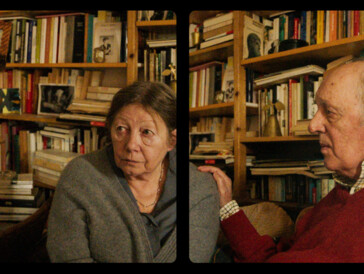
I was lucky enough to have producers who told me, «This is your movie!»
It's hard to find financing for first films without a script, because in January 2021 I had just written ten pages for this film, but my producers said «With only three characters, you can shoot it in four weeks. We'll pay for it and find someone who wants to buy the film».
To get financing for a film without a script, you need some trust. Fortunately, I had producers who had some money in their pockets and who trusted me. The whole process of writing the film, shooting it, editing it and delivering it took at least six months. Even a baby takes 9 months to come into the world, so it was extremely fast, and I like to work fast. When you finish a film in such a short time, it's an incredible thing, sometimes the distribution of the film and the promotion takes much longer than the whole creative process itself.
...that's why a lot of people tell me, "Your film feels like a documentary," because the acting is very free and natural.
On the shooting with only one script page:
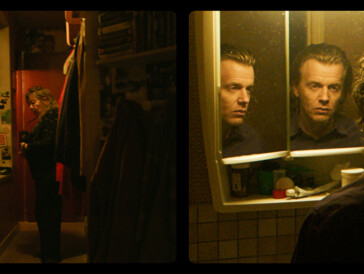
On the film set, we just shot with the only written paper we had, it was three pages long, so we had the 12 scenes of the rehearsal written on a quarter page. And then on set we developed the scene with the actors. I operated the camera during the rehearsals, because it's like a collective scene that's best done with your ideas and the ideas from the cinematographer, the actors, and also the assistant director.
So I feel more confident doing it that way. I wouldn't feel safe if I went to a set with written dialogue that I created with my own vocabulary, which isn't special because, for example, I couldn't invent four ways of speaking for different characters.
In my case, I find it much easier to let people speak in their own words and with their own body language in front of the camera, and that's why a lot of people tell me, "Your film feels like a documentary," because the acting is very free and natural, so even if you're not aware of it when you watch a film with written dialogue, you can tell that the actors are reproducing something, and it's not as fluid as it is when people create scenes in front of the camera.
Decisions in image composition and the personal reference:
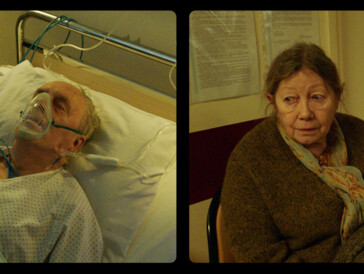
With «Vortex» I wanted to be more playful with the split screen, with the black frame. We shot one scene on the first day with a single camera and another scene with two cameras. The next morning, when I looked at the footage from the first day of shooting, I saw that it was actually much more fun to work with two scenes. We shot it with two cameras and from then on I decided that even if I wanted to have some scenes with only one camera, I would shoot them with two cameras in case I did want to keep the split screen from the beginning to the end, and now it was a good idea, also because it looks more claustrophobic.
When I saw my mother die, it was painful for me but I didn't see it as a bad solution, it felt natural.
The film is not autobiographical. For example, I don't have children, I have a sister, but I still felt very connected to the character of Francoise Lebrun because I was in a similar situation with my mother and also because I myself had brain damage two years ago and could have suffered the same consequences, but fortunately this was not the case.
I think death can also be a positive way out of physical decadence or mental exhaustion. For example, when I saw my mother die, it was painful for me but I didn't see it as a bad solution, it felt natural. I thought it would be good to portray the death of the father, which didn't happen like that in my real life. Also, because then the situation becomes more dramatic because he is the one who protects her, and when the man, the protector, dies before the woman.
Also, she never says «my darling» to him in the whole movie, but the moment he's dead, she starts looking for him saying, «Darling, where are you, darling?» which is a kind of drama you add to the drama, and also in this case I thought it would be good to present this as something natural. After my mother died, I also felt that something was missing in the space around me, hence the idea with split-screen that half the screen is blank when the character dies.
The identity and death of the apartment
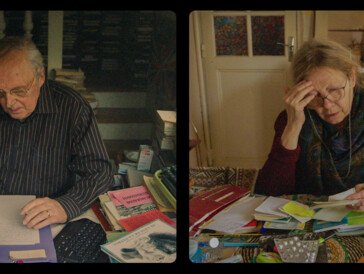
Many people have told me that, in addition to the main characters, they also read the apartment as its own identity and personality. At the end of the film you see the death of the apartment, and many people have told me that for them this was the most dramatic moment in the whole film, when the apartment is dead.
Also, the son's repeated drug gene use after the loss of his parents was felt by many people to be an identity of sorts and shows the impact that death can have on the loved ones left behind.
The topic that is negotiated in «Vortex» is important, because you should talk about it with your relatives as early as possible. It's an important discussion to start before something happens. This is universal, it happens in every single family, so just talk about it and help.
Welche weiteren Filme ab sofort neu im Kino zu sehen sind, erfährst du hier.





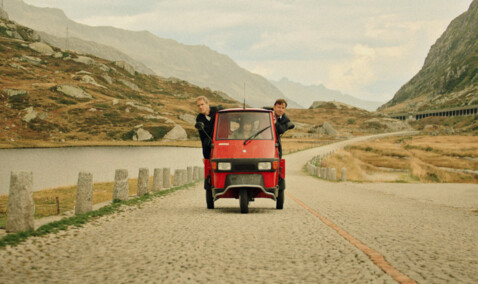





 Cineman Redaktion
Cineman Redaktion

Vous devez vous identifier pour déposer vos commentaires.
Login & Enregistrement